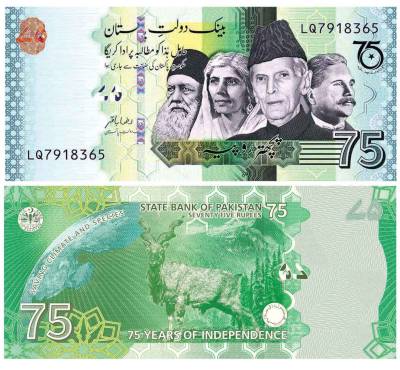SBP Clarifies That Rs.75 Commemorative Banknote Is a Legal Tender & Can Be Used as Medium of Exchange in All Transactions.
In recent news, the State Bank of Pakistan (SBP) has clarified that the Rs.75 commemorative banknote issued on the occasion of the 75th anniversary of the United Nations can be used as a legal tender for all transactions.
The announcement comes after reports of confusion among some citizens about the validity of the note. The SBP, in its statement, has emphasized that the note is fully authorized by the Government of Pakistan and can be used like any other currency note in circulation.
#SBP clarifies that Rs.75 commemorative banknote is a legal tender & can be used as medium of exchange in all transactions. pic.twitter.com/YhJPFtL7pz
— SBP (@StateBank_Pak) April 28, 2023
At first glance, this news might seem unremarkable. After all, a currency note issued by the central bank of a country should be considered legal tender by default. However, there are often misconceptions and myths surrounding commemorative banknotes and coins, which can lead to confusion among the public.
In this article, we will explore the significance of commemorative currency, the legality of using such notes as legal tender, and the implications of the SBP’s clarification for the public.

What Is a Commemorative Banknote?
A commemorative banknote is a special type of currency note that is issued to mark a particular occasion or event. Typically, these notes feature a design that is related to the event in question, such as a national monument, a historical figure, or a cultural symbol. Commemorative banknotes are often issued in limited quantities and are intended to be collector’s items. As such, they may have a higher face value than the regular currency notes of the same denomination.
While commemorative banknotes are not new, they have become more common in recent years. Many central banks issue such notes to celebrate significant milestones or anniversaries. For example, the United States Mint issues commemorative coins to mark events such as the Olympics or the founding of national parks.
In Pakistan, the SBP has issued commemorative banknotes to mark occasions such as the 70th anniversary of the country’s independence and the centenary of the Lahore Resolution.
Legal Status of Commemorative Banknotes
One of the most common misconceptions about commemorative banknotes is that they are not legal tender. Some people believe that these notes are simply souvenirs or collector’s items and cannot be used in regular transactions. However, this is not true. In most cases, commemorative banknotes are fully authorized by the government and are considered legal tender.
Legal tender is a term that refers to the currency or coins that are recognized by law as valid for settling debts and other obligations. In Pakistan, the legal tender includes all notes and coins issued by the SBP. This includes regular currency notes as well as commemorative notes, which are issued under the authority of the government.
Implications of SBP’s Clarification
The SBP’s recent clarification regarding the Rs.75 commemorative banknote is significant because it dispels any confusion or misinformation about the note’s legal status. By confirming that the note can be used as a legal tender, the SBP has ensured that the public can use the note without any hesitation or doubt.
This is particularly important because the note has a higher face value than the regular currency notes of the same denomination, which could have led to misunderstandings about its validity.
Furthermore, the SBP’s clarification highlights the importance of educating the public about commemorative banknotes and their legal status. As more such notes are issued in Pakistan and around the world, it is essential to ensure that people understand their value and can use them in regular transactions.
This will require ongoing efforts by the central bank and other stakeholders to raise awareness and dispel myths about commemorative currency.


